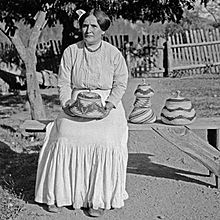Elizabeth Hickox facts for kids
Quick facts for kids
Elizabeth Conrad Hickox
|
|
|---|---|
 |
|
| Born | ca. 1872/1875 Karuk Territory, California
|
| Died | July 19, 1947 California
|
| Nationality | Wiyot Tribe |
| Known for | Native American basketry |
| Spouse(s) | Frank Merrill, Luther Hickox |
| Patron(s) | Grace Nicholson |
Elizabeth Conrad Hickox (born around 1872 or 1875, died July 19, 1947) was a very talented Wiyot artist. She was known as a master basket weaver. Many people thought she was one of the best basket makers of her time. Her baskets were special because they had unique shapes, weaving methods, colors, and designs. This made them stand out from other baskets made in the Lower Klamath area.
Contents
Elizabeth Hickox's Early Life
Elizabeth Conrad Hickox was born in either 1872 or 1875. Her mother was Wiyot, and her father was European-American. When Elizabeth was a teenager, she married Frank Merrill, who was from the Karuk people. They had two children together, Jessie and Bruce.
Later, in 1895, she married Luther Hickox. Luther owned a gold mine and was part owner of a sawmill. He later became a justice of the peace. Elizabeth and Luther Hickox had a good life. They were well-respected among the Karuk people and were financially secure. Elizabeth Hickox lived along the Salmon River in Northern California.
Elizabeth Hickox's Artwork
Hickox used many different natural materials to weave her beautiful baskets. These included grape root twining, white bear grass (Xerophyllum tenax), and dyed Woodwardia fern. She also used black maidenhair fern and dyed porcupine quills.
She often used a dark material called Adiantum aleuticum. She would contrast this dark material with porcupine quills dyed yellow using a type of lichen called Letharia vulpina. Choosing to use mostly dark materials with bright yellow accents was her own artistic decision. It was not because someone told her to do it for sales. Between 1911 and 1934, she made about five baskets each year.
Selling Baskets
Elizabeth Hickox and her daughter, Louise, wove and sold their baskets to a woman named Grace Nicholson. Nicholson continued to buy their artwork even during the Great Depression, a time when many people had little money. Even though Hickox was Wiyot, Nicholson sold her baskets as "Karuk" art. This was because Elizabeth lived in the Karuk area.
Before Hickox met Nicholson, she was already making fine-art baskets. These were baskets made for their beauty and artistic value, not just for everyday use. After Nicholson stopped buying baskets in 1934, Hickox kept weaving. She continued to make baskets for fun, for practical use, and as gifts for others.
In 2020, some of Hickox's amazing artwork was shown in a special exhibit. It was called Hearts of Our People: Native Women Artists at the Smithsonian American Art Museum.
Elizabeth Hickox's Death
Elizabeth Hickox passed away on July 19, 1947.
Public Collections of Elizabeth Hickox's Baskets
You can find Elizabeth Hickox's baskets in many museums and public collections. Here are some of them:
- Autry Museum of the American West
- Denver Art Museum
- Field Museum of Natural History
- National Museum of the American Indian, part of the Smithsonian Institution
- Lauren Rogers Museum of Art
- Natural History Museum of Los Angeles County
- Peabody Museum of Archaeology and Ethnology at Harvard University
- University of Pennsylvania Museum of Archaeology and Anthropology

